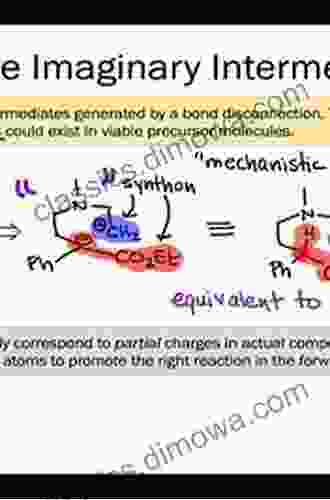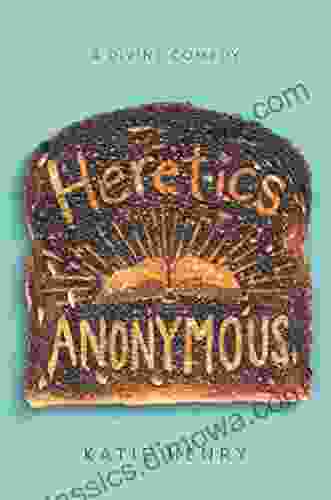Unlocking the Power of Synthons: A Comprehensive Guide to Organic Synthesis

4.7 out of 5
| Language | : | English |
| File size | : | 13724 KB |
| Text-to-Speech | : | Enabled |
| Enhanced typesetting | : | Enabled |
| Print length | : | 277 pages |
| Screen Reader | : | Supported |
Organic synthesis is a powerful tool that allows chemists to create complex molecules from simpler building blocks. At the heart of organic synthesis is the concept of synthons, which are functional groups or reactive intermediates that can undergo chemical reactions to form new bonds and create more complex molecules.
Understanding the role of synthons is essential for mastering organic synthesis. In this article, we will explore the diverse world of synthons, their applications, and how they can help you achieve efficient and selective reactions.
What are Synthons?
A synthon is a functional group or reactive intermediate that can be used as a building block in organic synthesis. Synthons are typically stable and unreactive under normal conditions, but they can be activated by a variety of reagents and catalysts to participate in chemical reactions.
The most common types of synthons include:
- Carbanions: Negatively charged carbon atoms that can undergo nucleophilic addition reactions.
- Carbocations: Positively charged carbon atoms that can undergo electrophilic addition reactions.
- Radicals: Neutral species with unpaired electrons that can undergo free radical reactions.
- Electrophiles: Electron-poor species that can accept electrons from nucleophiles.
- Nucleophiles: Electron-rich species that can donate electrons to electrophiles.
Applications of Synthons in Organic Synthesis
Synthons are versatile building blocks that can be used to create a wide variety of organic compounds. Some of the most common applications of synthons include:
- Natural product synthesis: Synthons can be used to synthesize complex natural products, such as alkaloids, terpenes, and steroids.
- Drug discovery: Synthons can be used to synthesize new drug candidates and optimize the properties of existing drugs.
- Materials science: Synthons can be used to synthesize new materials with unique properties, such as polymers, plastics, and ceramics.
- Fine chemicals synthesis: Synthons can be used to synthesize fine chemicals, such as fragrances, flavors, and dyes.
How to Use Synthons Effectively
Using synthons effectively requires an understanding of their reactivity and selectivity. Here are some tips for using synthons in organic synthesis:
- Choose the right synthon: The choice of synthon depends on the desired reaction outcome. Consider the reactivity and selectivity of the synthon, as well as its compatibility with the other reagents and conditions.
- Activate the synthon: Synthons are typically activated by a variety of reagents and catalysts. Choose the appropriate activator based on the reactivity of the synthon and the desired reaction conditions.
- Control the reaction conditions: The reaction conditions, such as temperature, solvent, and pH, can have a significant impact on the outcome of the reaction. Optimize the reaction conditions to ensure the desired product is formed in high yield and selectivity.
Synthons are powerful tools that can be used to create a wide variety of organic compounds. Understanding the role of synthons is essential for mastering organic synthesis. By choosing the right synthon, activating it appropriately, and controlling the reaction conditions, you can achieve efficient and selective reactions to synthesize complex molecules with confidence.
4.7 out of 5
| Language | : | English |
| File size | : | 13724 KB |
| Text-to-Speech | : | Enabled |
| Enhanced typesetting | : | Enabled |
| Print length | : | 277 pages |
| Screen Reader | : | Supported |
Do you want to contribute by writing guest posts on this blog?
Please contact us and send us a resume of previous articles that you have written.
 Book
Book Novel
Novel Page
Page Chapter
Chapter Text
Text Story
Story Genre
Genre Reader
Reader Library
Library Paperback
Paperback E-book
E-book Magazine
Magazine Newspaper
Newspaper Paragraph
Paragraph Sentence
Sentence Bookmark
Bookmark Shelf
Shelf Glossary
Glossary Bibliography
Bibliography Foreword
Foreword Preface
Preface Synopsis
Synopsis Annotation
Annotation Footnote
Footnote Manuscript
Manuscript Scroll
Scroll Codex
Codex Tome
Tome Bestseller
Bestseller Classics
Classics Library card
Library card Narrative
Narrative Biography
Biography Autobiography
Autobiography Memoir
Memoir Reference
Reference Encyclopedia
Encyclopedia Matthew Brenden Wood
Matthew Brenden Wood Richard Wright
Richard Wright Celia Haddon
Celia Haddon Louis Fantasia
Louis Fantasia Samir Saran
Samir Saran Vicki Courtney
Vicki Courtney Ashley Albi
Ashley Albi Charles Ney
Charles Ney Austin Patton
Austin Patton Ashley Elston
Ashley Elston Rudyard Kipling
Rudyard Kipling Avery Daniels
Avery Daniels Donald F Kuratko
Donald F Kuratko Sue Mcdonagh
Sue Mcdonagh Barbara Stuber
Barbara Stuber Elaine Eff
Elaine Eff Jim Duffy
Jim Duffy Sharon Dogar
Sharon Dogar Aspen Nelson
Aspen Nelson Aya Shouoto
Aya Shouoto
Light bulbAdvertise smarter! Our strategic ad space ensures maximum exposure. Reserve your spot today!

 Gavin MitchellUnlock Your Inner Confidence, Trust, and Freedom: A Transformative Journey...
Gavin MitchellUnlock Your Inner Confidence, Trust, and Freedom: A Transformative Journey... Pablo NerudaFollow ·16k
Pablo NerudaFollow ·16k Ralph EllisonFollow ·14.3k
Ralph EllisonFollow ·14.3k Nick TurnerFollow ·19k
Nick TurnerFollow ·19k Casey BellFollow ·8.4k
Casey BellFollow ·8.4k Dalton FosterFollow ·15.5k
Dalton FosterFollow ·15.5k Oliver FosterFollow ·3.7k
Oliver FosterFollow ·3.7k Isaac AsimovFollow ·4.2k
Isaac AsimovFollow ·4.2k Jamal BlairFollow ·18.4k
Jamal BlairFollow ·18.4k

 Marcus Bell
Marcus BellHigh Lonesome: A Literary Journey into the Heart of the...
<p>Hannah weaves a intricate...

 Gabriel Hayes
Gabriel HayesRediscover Gideon Green's Timeless Adventures in "Gideon...
Embark on an Extraordinary Journey with...

 Samuel Taylor Coleridge
Samuel Taylor ColeridgeEscape to a Literary Haven: Discover the Enchanting World...
Embark on an Extraordinary Literary...
4.7 out of 5
| Language | : | English |
| File size | : | 13724 KB |
| Text-to-Speech | : | Enabled |
| Enhanced typesetting | : | Enabled |
| Print length | : | 277 pages |
| Screen Reader | : | Supported |
















